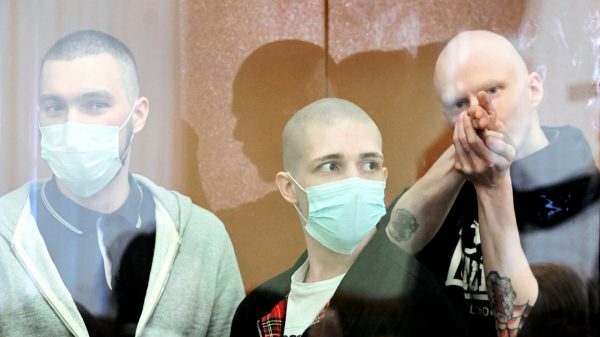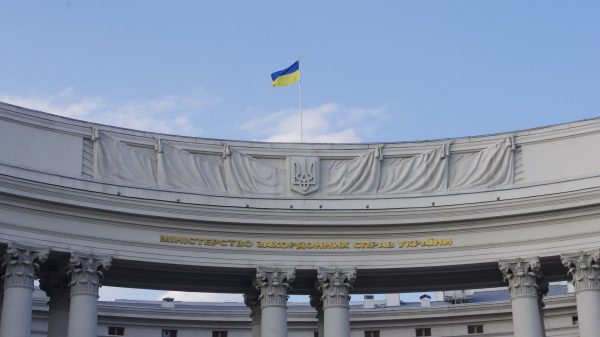 Far-right protesters at the «Unite the Right» rally Photo: Anadolu
Far-right protesters at the «Unite the Right» rally Photo: Anadolu
Known for its craft beer and independent bookstores, Portland, Oregon is not an obvious place for the United States to begin to burst at the seams. A haven for millennial hipsters and little tech bros, it prides itself on being a vegan, eco-friendly, migrant-friendly beacon of progressive America.
One person, however, that many Portlanders have never warmed to is Donald Trump, and when he unveiled his “zero tolerance” immigration policy in 2018, protesters took to the streets. The same thing happened with the far-right Patriot Prayer and Proud Boys movements. That's how Alexander Reed Ross, a Portland scholar who studies political violence, gained some first-hand experience of his specialty.
“A big fight broke out between about 150 right-wingers and 75 anti-fascists, and at one point about seven right-wingers crowded around one child, really beating him up,” he recalls. “I rushed to push them away, and at that moment one of them punched me in the face.”
Ross retreated, but then returned to the fight, warning the crowd that they risked killing the man they were beating. “Later, the guy who got beaten said I probably saved his life.”
Footage of the incident can still be seen on YouTube, one of countless videos of violence during the Trump administration, which also saw Black Lives Matter protests in 2020 and the storming of the Capitol in 2021.

Similar scenes of unrest also appear at the beginning of the new film «Civil War», which takes the concept of America's political division to its logical extreme. In director Alex Garland's new dystopian blockbuster, the enemy is not Russia, Islamic terrorists or artificial intelligence, but the American people themselves, turned against each other.
The film is fictional, but due to widespread fears that the November presidential election the election could plunge America back into chaos, already seen by many as a cautionary tale. Some have even questioned the wisdom of Hollywood in releasing it under the current climate, fearing it could further heighten tensions.
“Is this an action movie that feeds the violent fantasies of neo-Confederates, anti-government militias and MAGA morons, a good idea?” asked one participant in the discussion thread on Reddit. “Personally, I don’t think so.”
Such anxiety is not unusual: according to a 2022 YouGov/The Economist poll, 40 percent of Americans believe another civil war will be “at least somewhat degree is likely in the next 10 years.”
Perhaps out of fear. To further heighten such tension, in the film Garland takes pains not to say what sparked the conflict or who the combatants are. As he said at a recent preview of the film at the SXSW festival in Texas: «We don't need an explanation — we know exactly why this could happen, what the fault lines and pressures are.»
 Realistic? Scene from the Civil War
Realistic? Scene from the Civil War
All viewers learn is that 19 states seceded from Washington's rule, led by a (somewhat unlikely) union between Texas and California, sparking a war that left the country in ruins. Even the film's main characters are ostensibly neutral observers — a team of journalists led by an all-seeing war photographer played by Kirsten Dunst who travel across the country trying to interview an embattled president (Nick Offerman).
Indeed, the film is as much about journalism as it is about war, a profession that, even in the cynical Trumpian era of fake news, still seems to hold some romance for Garland. Dunst and her team are completely fearless when pursuing soldiers in close combat. Their bravery earns them remarkable photographs — although if this correspondent's experience covering real wars for The Telegraph is anything to go by, the chances of them still being alive to get their Pulitzers at the end of it all will be limited. Also, the «PRESS» lettering on their car has a slightly pinkish tint. In most modern conflicts—especially civil wars in 21st-century America—this is just as likely to get journalists in trouble as it is to get them out.
However, Garland leaves no doubt in the minds of the audience that the film is inspired by real events in the United States. The president is an authoritarian who has shut down the FBI — an apparent reference to Trump's own legal run-ins with the FBI. The initial front line of the war is Charlottesville, Virginia, the site of violent clashes between the far right and anti-fascists in 2017 at the notorious «Unite the Right» rally, during which one anti-fascist protester was killed. And while there is no overt redneck versus woke confrontation, one soldier who holds Dunst's crew at gunpoint asks pointedly, «What kind of Americans are you?»
 Kirsten Dunst as war reporter Lee Smith in Alex Garland's Civil War
Kirsten Dunst as war reporter Lee Smith in Alex Garland's Civil War
So could this scenario happen in real life? Could America see a second civil war, in which MAGA supporters and liberals replace Confederates and Yankees, and culture wars become a fault line rather than slavery?
Perhaps unsurprisingly, America is as divided on this issue as on any other. For every pessimist predictor, there are others who note that the United States has experienced similar upheavals in the past. Take, for example, the 1960s, which saw the countercultural revolution, protests against the Vietnam War, and the assassinations of John F. Kennedy and Martin Luther King. Could things really get worse?
Girland, for one, seems to think so. Social media, he said, has increased tribalism in US politics, with both sides portraying each other as not just wrong, but evil.
“Left and right are ideological debates about how to run the state. » he told SXSW. «But we've turned it into 'good' and 'bad'… it's fucking idiotic and incredibly dangerous.»
Ross, who has studied far-right movements in his work at Portland State University, believes the risk of war down from 2020, when “low-intensity conflict may have been possible.” But he is also far from complacent.
“A lot of the Trump supporters who stormed the Capitol are now in jail, and it was a little confusing for them,” he says. “But if Trump gets re-elected, he wants revenge — he will forgive all the Proud Boys, and they will return to places like Portland to fight the people again.”
 “More divided along ideological and political lines than at any time since the 1850s”: far right and anti-Fascist protesters clash in Portland, 2021. Photo: Mathieu Lewis-Rolland/AFP
“More divided along ideological and political lines than at any time since the 1850s”: far right and anti-Fascist protesters clash in Portland, 2021. Photo: Mathieu Lewis-Rolland/AFP
A rematch of past street fights isn't the only looming flashpoint. Trump could still face prison time for his role in the Capitol riot, infuriating his supporters. If re-elected, he threatened mass deportations of undocumented migrants and federal cuts to Democratic-run cities with rising crime rates, calling them «anarchist jurisdictions.»
He also continues to use language that is often compared to that of Hitler, promising to «eradicate the communists, Marxists, fascists and left-wing radical thugs who live like parasites within our country.»
p>
Meanwhile, culture wars continue to rage over issues such as abortion rights, the teaching of race and gender identity in schools, and border controls, with different states taking matters into their own hands. Republican-run Texas, for example, has refused to comply with a Supreme Court order to remove razor wire along the Rio Grande, citing President Biden's failure to stop illegal immigration.
In addition, the gap between city and countryside is increasing. In rural Oregon, for example, conservative voters want to break away from neighboring Idaho, unhappy at being lumped in with liberal Portland.
 During the Civil War, reporters found themselves deep on the front lines. Photo: Murray Close
During the Civil War, reporters found themselves deep on the front lines. Photo: Murray Close
In a recent article for the London think tank Chatham House: Bruce Stokes, a fellow at the Americas Program, argued that the US is now «more divided along ideological and political lines than at any time since the 1850s.»
“I don’t think we’ll see armies of soldiers in blue and gray fighting,” he tells me, referring to the uniforms worn by Unionists and Confederates. “But if you look at a range of issues, from abortion to LGBT rights to the death penalty, you get a split similar to those that existed during the Civil War.”
Although formal state opposition and state conflict seem unlikely , what could happen is Northern Ireland style riots. Instead of the regular armed forces that fight in the film, there will be gangs and paramilitaries committing mutual killings.
“I'm not saying anyone is going to kill Biden or Trump, but all the other legislators and officials have no security,” Mr. Stokes says. “Can some politically insane person kill one person, leading to a copycat effect?”
 Ku Klux- clan protest in 2017. Photo: Chet Strange
Ku Klux- clan protest in 2017. Photo: Chet Strange
This is far from a rhetorical question. Last November, David DePape, a right-wing conspiracy theorist, was found guilty of attempting to kidnap former Democratic House Speaker Nancy Pelosi. Meanwhile, California resident Nicholas Roske is awaiting trial on charges of plotting to assassinate Supreme Court Justice Brett Kavanaugh, Trump's nominee, at his home in 2022.
The risk of bloodshed is greatly eased by America's far-right forces. — liberal gun laws. Many far-right militias in the US are already heavily armed, as evidenced by the assault rifles they carried during protests during the Trump years.
Ross believes left-wing groups may also now mobilize if troubles flare up again. He fears the rise of American versions of far-left groups such as Italy's Red Brigades, which killed about 50 people in kidnappings and robberies in the 1970s and 1980s.
“Left-wing protesters have suffered from police brutality. during the 2020 protests, and it could end up just sending people into a traumatic spiral that could trigger enormous violence,” he said. “I am concerned that if Trump is elected again, it could give rise to new leftist formations that will not be constructive at all.”
Just as the Soviet Union is believed to have financed the Red Brigades and other European terrorist groups and warring factions in America may receive covert support from Washington's enemies abroad, such as Vladimir Putin's Russia.
Although they could not directly confront the state, they could take refuge among sympathetic civilians, as the IRA did during the Troubles. In extreme cases, insurgent movements may even receive support from local National Guard units and sheriff's departments, which often value their independence from the federal government.
<р>The person most afraid of the risk of civil war is Mark McCloskey, a lawyer from Missouri. At the height of the BLM demonstrations in 2020, he and his wife, Patricia Patricia, pointed guns at protesters who were marching through their private neighborhood. Photos of the standoff, in which Mr. McCloskey carried a rifle and his wife carried a pistol, became a symbol of how close America was to open conflict.
Mr. Closky, who has since run for the Republican nomination and been hailed as a hero in conservative circles, told me about some of the possible “tipping points” he sees in the future conflict. They included an attempt to jail Trump, dramatically stricter gun control measures and «BLM-type riots that will be met with armed resistance.»
He added: “I could go on and on about what the average person sees as a political system that is deliberately weakening our country — open borders where illegal immigrants get funding and rights denied to citizens, rampant drug use that kills every year. more and more Americans. while states push for legalization of drugs, promotion of anti-family lifestyle… war on religion. So yes, I see civil war looming on the horizon. The battle lines have already been drawn.”
 “I see a civil war looming on the horizon”: Nick Offerman plays President Trump in “The Civil War” Photo: Murray Close
“I see a civil war looming on the horizon”: Nick Offerman plays President Trump in “The Civil War” Photo: Murray Close
Garland's film has already sparked lengthy online debate about how such a conflict would play out. And with 2020s America divided, no debate can end with predictions about which side will win.
“I see some sort of alliance between the working class and the countryside versus the urban elite of the laptop class,” one Reddit poster wrote. “Of these two, I can guess who is tougher, more independent and probably has military experience and knows how to use weapons. This is not an investment banker from the Hamptons or an HR executive from a Silicon Valley tech firm.”
In a civil war, however, a military victory does not mean a moral victory, especially when the arguments discuss complex issues such as values and identity. Stokes, who at 74 is old enough to remember the US student protests of the 1960s, warns radicals of all persuasions to be careful what they wish for, whether Portland anti-fascists or Virginia Trump stalwarts.
“I remember in 1968 there was a lot of talk among young students like me that we might have to make a revolution. The romantic Marxist sense of overthrowing the old order and establishing a new one. We forgot that when it happened in Russia, there was a lot of terror afterwards.»
The Thrill of the Civil War on every step of the way Read review
Civil War is now in theaters


























































Свежие комментарии